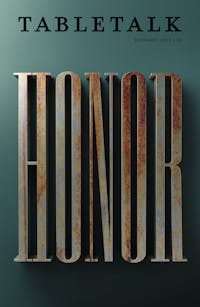
Request your free, three-month trial to Tabletalk magazine. You’ll receive the print issue monthly and gain immediate digital access to decades of archives. This trial is risk-free. No credit card required.
Try Tabletalk NowAlready receive Tabletalk magazine every month?
Verify your email address to gain unlimited access.
It is commonly acknowledged that the cornerstone of the English literary canon is Shakespeare. What is only slightly less commonly acknowledged is that the cornerstone of Shakespeare is the virtue of honor. Just consider a brief sampling of the Bard’s unforgettable lines:
Honor’s thought reigns solely in the breast of every man. (Henry V, 4.3)
Mine honor is my life, both grow in one. Take honor from me and my life is done. (Richard II, 1.3)
If I lose my honor, I lose myself. (Antony and Cleopatra, 3.4)
By Jove, I am not covetous for gold, nor care I who doth feed upon my cost; it yearns me not if my garments wear; such outward things dwell not in my desires: but if it be a sin to covet honor, I am the most offending soul alive. (Henry V, 4.3)
Of course, much has changed since Shakespeare penned those words. The decline of honor has been precipitous from its place at the pinnacle of Western culture and Christian virtue to utter obscurity, or perhaps even ignominy.
Honor once served as a barometer of the virtue and vitality of both men and nations. It was easily recognized and it was easily defined. It was foundational to healthy human relationships. It was vital for the maintenance of order in a civil society. After all, the scriptural commands to honor abound.
Alas, the designer disaster wrought by the twin plagues of the Enlightenment, Rationalism and Romanticism, have together purposefully undermined this bulwark of civility. From Rousseau’s “Noble Savage” to Derrida’s “Deconstructed Man,” Nietzsche’s “Übermensch” to Eco’s “Anti-Hero,” the ideal of honorable men and women with honorable motivations and intentions has been under relentless attack.
Francis Schaeffer rightly identified the epistemological danger of separating truth into upper and lower stories—into Platonic universals above and Aristotelian particulars below, into values upstairs and facts downstairs. Fragmenting the notion of truth in this way ensures that all manner of evil may be justified. This is the logic behind the 1973 Roe v. Wade decision, where the inescapable scientific fact of human life (lower-story objective reality) was separated from the rights and protections of personhood (upper-story subjective value). This is the same logic behind the 2015 Obergefell v. Hodges decision, wherein the historic definition of marriage between a man and a woman (lower-story objective reality) was set aside for a newly created social construct (upper-story subjective value). It is the logic behind moral relativism. It is the logic behind the inversion of values such as purity, honesty, freedom, love, hate, tolerance, and sensitivity. It is the logic behind what the postmodern developmental theorist Clare Graves has called “the new values that make us worthy for the momentous leap into second tier integral consciousness.” It is the logic behind the stripping of all honor from the virtue of honor.
But, lest we lose our way in the philosophical fog or the political foment of these contemporary issues, it is important to remember that any attempt at sundering truth into separate upper and lower categories is merely a pretext for unbelief. The decline and fall of honor in our day is not the second- or third-order consequence of the new fundamentalist dogmas of our abortion-affirming, LGBTQ+, or postmodern soothsayers. Instead, it is unbelief in the unchanging standards of an unchanging God that has precipitated this catastrophic domino effect across the terrain of our culture.
Contemplating such an inconceivable loss—the loss of any sense of honor, we might be tempted to join Shakespeare’s lament: “What is honor? A word. What is in that word honor? A trim reckoning” (Henry IV, Part I, 5.1).
Thankfully, we have the great assurance that God’s providential purposes cannot and will not be frustrated. We have access to the “precious and very great promises” of the gospel (2 Peter 1:4). We have the sure and certain hope that every “argument,” every “pretension,” and every “lofty opinion” raised up against the knowledge of God will be torn down. In that day, every thought will “be made captive to obey Christ” (2 Cor. 10:5).
Between here and there, we no doubt have our work cut out for us. But we can look forward to that day when all due honor will be restored. “To him who sits on the throne and to the Lamb be blessing and honor and glory and might forever and ever!” (Rev. 5:13).
